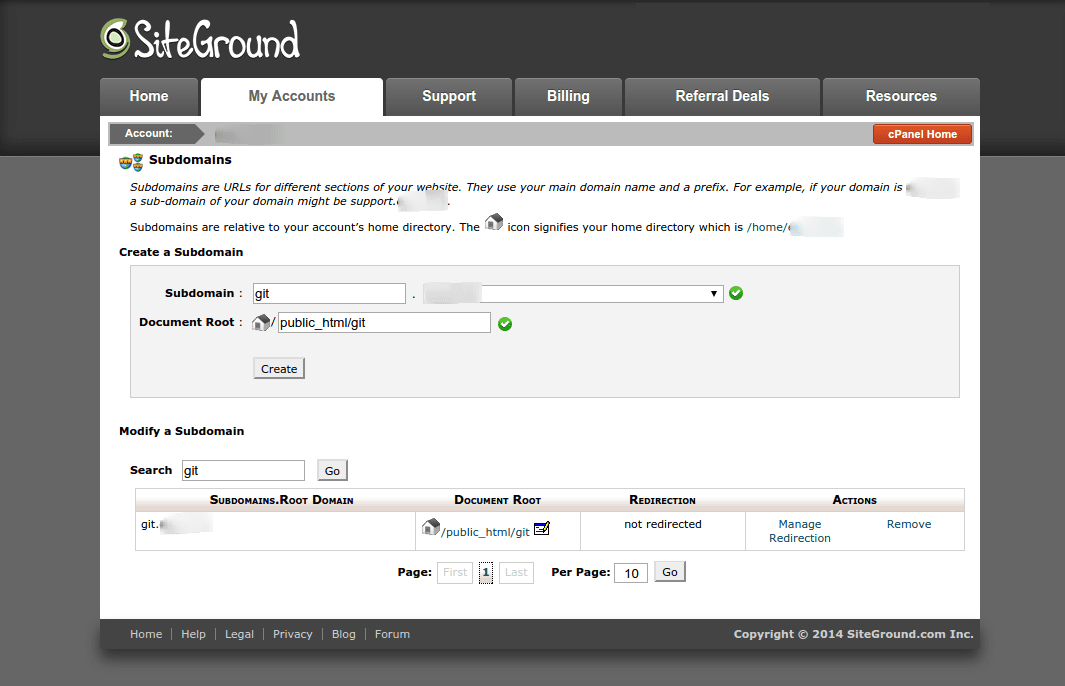
This version of GitHub Enterprise will be discontinued on This version of GitHub Enterprise was discontinued on 2020-01-22. No patch releases will be made, even for critical security issues. For better performance, improved security, and new features, upgrade to the latest version of GitHub Enterprise.For help with the upgrade, contact GitHub Enterprise support.
- Generate Key In Cpanel For Git Search
- Generate Key In Cpanel For Gitano
- Generate Key In Cpanel For Git Server
How to connect via SSH using keys. In this example, we will use the Putty SSH client and key pair generated by cPanel in order to access the server via SSH. Once everything is set, click Generate Key. Now you should see both private and public keys you created. ON windows if you have git for windows installed, run git-gui. Then click Help then click Show Ssh Key, then click Generate Key. Then click Help then click Show Ssh Key, then click Generate Key. While you're at it, then copy to the clipboard, and then go to your Gitlab account page and add the SSH key to your Gitlab account's ssh settings. Click Generate Key. CPanel generates the public and private keys and saves them in the /home/ username /.ssh directory, where username represents your A2 Hosting account username. Click Go Back. Under Public Keys, locate the name of the key you just created. Under Actions, click Manage.
After you've checked for existing SSH keys, you can generate a new SSH key to use for authentication, then add it to the ssh-agent.

In this article
If you don't already have an SSH key, you must generate a new SSH key. If you're unsure whether you already have an SSH key, check for existing keys.
If you don't want to reenter your passphrase every time you use your SSH key, you can add your key to the SSH agent, which manages your SSH keys and remembers your passphrase.
Generating a new SSH key
- Oct 11, 2016 Using GitHub via HTTPS with Git Extensions can become pretty boring. SSH to the rescue. Step 1: Click on Tools - Generate or Import Key. Step 2: Click on Generate. Note: Move the mouse over the blank area to generate randomness when generating the SSH key. Step 3: Click on Save Private Key.
- Most git hosting providers offer guides on how to create an SSH Key. Generate an SSH Key on Mac and Linux. Both OsX and Linux operating systems have comprehensive modern terminal applications that ship with the SSH suite installed. The process for creating an SSH key is the same between them. Execute the following to begin the key creation.
- Jul 25, 2019 This post will be pretty straightforward and will cover Windows, Mac, and Linux on how to generate SSH keys for Git authorization. A straightforward post covering a step-by-step approach for Windows, Mac, and Linux users.
- Aug 08, 2019 Generate a New Key. Use this section of the interface to create new SSH key pairs, which include a public key and a private key. To generate a new SSH key pair, perform the following steps: Click Manage SSH Keys. Click Generate a New Key. To use a custom key name, enter the key name in the Key Name (This value defaults to idrsa): text box.
Open TerminalTerminalGit Bash.
Paste the text below, substituting in your GitHub Enterprise email address.
This creates a new ssh key, using the provided email as a label.
When you're prompted to 'Enter a file in which to save the key,' press Enter. This accepts the default file location.
At the prompt, type a secure passphrase. For more information, see 'Working with SSH key passphrases'.
Adding your SSH key to the ssh-agent
Before adding a new SSH key to the ssh-agent to manage your keys, you should have checked for existing SSH keys and generated a new SSH key. When adding your SSH key to the agent, use the default macOS ssh-add command, and not an application installed by macports, homebrew, or some other external source.
Start the ssh-agent in the background.
If you're using macOS Sierra 10.12.2 or later, you will need to modify your
~/.ssh/configfile to automatically load keys into the ssh-agent and store passphrases in your keychain.Add your SSH private key to the ssh-agent and store your passphrase in the keychain. If you created your key with a different name, or if you are adding an existing key that has a different name, replace id_rsa in the command with the name of your private key file.
Note: The
-Koption is Apple's standard version ofssh-add, which stores the passphrase in your keychain for you when you add an ssh key to the ssh-agent.If you don't have Apple's standard version installed, you may receive an error. For more information on resolving this error, see 'Error: ssh-add: illegal option -- K.'
Add the SSH key to your GitHub account.
If you have GitHub Desktop installed, you can use it to clone repositories and not deal with SSH keys. It also comes with the Git Bash tool, which is the preferred way of running git commands on Windows.
Generate Key In Cpanel For Git Search
Ensure the ssh-agent is running:
- If you are using the Git Shell that's installed with GitHub Desktop, the ssh-agent should be running.
If you are using another terminal prompt, such as Git for Windows, you can use the 'Auto-launching the ssh-agent' instructions in 'Working with SSH key passphrases', or start it manually:
Add your SSH private key to the ssh-agent. If you created your key with a different name, or if you are adding an existing key that has a different name, replace id_rsa in the command with the name of your private key file.
Add the SSH key to your GitHub account.
Start the ssh-agent in the background.
Add your SSH private key to the ssh-agent. If you created your key with a different name, or if you are adding an existing key that has a different name, replace id_rsa in the command with the name of your private key file.
Add the SSH key to your GitHub account.
Further reading
- 'About SSH'
- 'Working with SSH key passphrases'
I tried setting up SSH Access from cPanel first time last week and it worked seamlessly without any issue. I was able to login and execute some commands to check higher CPU usage and memory issue.
Last week at Crunchify, LLC we were debugging higher CPU issue and wanted to have login access to our hosting server. We are hosted at Squidix web hosting and so far it’s working very well. By the way, as of now, higher CPU issue is resolved. It was related to Disqus and you could find all detailed information here on Github official Issue #118 page.
In this tutorial we will go over step by step how to setup SSH on your Macbook or Desktop correct way to access your VM (Virtual Machine) /Physical host.
This tutorial also works if you have any of below questions
- What is SSH Access in cPanel?
- Can I login to my Shared Hosting VM using SSH Access?
- cPanel and SSH Access process
- Login to your hosting account using cPanel’s SSH Access option
- How to access hosting account via SSH
Let’s get started:
Step-1
Loginto cPanel and click onSSH Accessicon underSecurityPanel- Click on
Manage SSH Keysbutton - Click on
Generate a New Keybutton
- Make sure you choose these settings
- Key Name:
id_rsa - Key Password: Provide
strong password - Key Type:
RSA - Key Size:
2048 - Click on
Generate Key

Step-2
- Your Key will be generated successfully and it will be saved under your
cPanel accountunder/home/crunchify/.ssh/folder. - Click on
Go Backlink.
Step-3
- By default
Public Keywont be authorized. - You need to Authorize Key by clicking
Managebutton and thenAuthorize buttonin next screen.
Step-4
- Now
DownloadyourPrivateKeyid_rsa. - It will download your key to
~/Downloads/folder on Macbook pro (I’m using Mac).
Step-5
- Now copy
id_rsaprivate key from/Users/appshah/Downloadsfolder to~/.sshfolder - SSH to your host using command
ssh crunchify@45.56.17.128crunchifyis my cPanel username (modified)45.56.17.128is a cPanel IP
- You will be asked to add host. RSA key fingerprint will be added to
known_hosts. - Provide your
cPanel Passwordand you should be in 🙂 - Try executing below few commands
top– to check memory and CPUuptime– to check load average on VM
NOTE: Below SSH and RSA information has been modified already for security reason. Try executing each commands in sequence.
2 4 6 8 10 12 14 16 18 20 22 24 | /Users/appshah/Downloads bash-3.2$cp id_rsa~/.ssh// Copy file bash-3.2$cd~/.ssh// Go to .ssh folder bash-3.2$ls-ltr// list files -rw-r--r--1appshah appshah2220Aug1214:39known_hosts bash-3.2$ssh crunchify@45.56.17.128// SSH to your hosting account The authenticity of host'45.56.17.128 (45.56.17.128)'can't be established. RSA key fingerprint is SHA256:aVZRglGWYnV1sdfsd#$@#@WvK9fsqmjuBIE7Vek. Are you sure you want to continue connecting (yes/no)? yes crunchify@45.56.17.128'spassword: crunchify@squidix1.xyz.com[~]# crunchify@squidix1.xyz.com[~]# top // just execute some commands and you will see stats crunchify@squidix1.xyz.com[~]# uptime // check load average on server |
You will now be logged into your account via SSH. This works across any hosting provider and any plan you are on. This is a universal method to login to your hosting account using SSH.
Generate Key In Cpanel For Gitano
Join the Discussion

Generate Key In Cpanel For Git Server
Share & leave us some comments on what you think about this topic or if you like to add something.